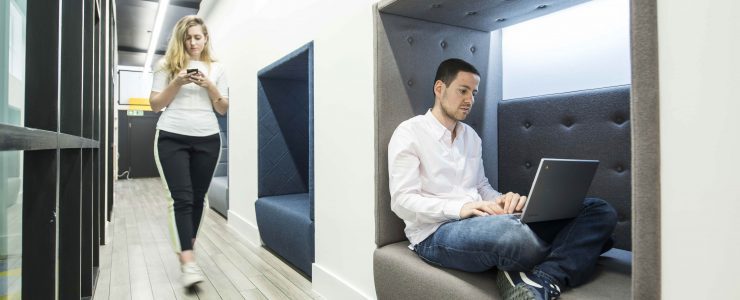
HSBC: From private offices to coworking space
Europe’s second-largest bank, HSBC, has moved from private offices to coworking space in a bid to significantly cut its carbon footprint, as well as costs.
The multinational bank, with total assets of £2.161 trillion, is looking to reduce its carbon footprint by 20% and its business travel expenses by up to 50% during the next 12 months by moving to flexible working spaces.
HSBC follows other international companies, such as Samsung and Coca-Cola, by transferring operations to coworking space.
Growth of HSBC
British banker and politician Thomas Sutherland founded the Hongkong and Shanghai Bank on 3rd March 1865 in the then colony of British Hong Kong. It became the Hongkong and Shanghai Banking Corporation on 14th August 1866.
In 1980, HSBC acquired a 51% shareholding in the Marine Midland Bank, based in the US, gaining full ownership in 1987. In 1992, HSBC took over the UK-based Midland Bank and relocated its world headquarters to London from Hong Kong in 1993.
It also purchased Brazil’s Banco Bamerindus for $1 billion in March 1997 and Roberts SA de Inversiones of Argentina in May 1997 for $600 million. In May 1999, HSBC bought the Republic National Bank of New York for $10.3 billion, expanding its presence in the US market.
Further expansion in central Europe occurred in 2000, with the acquisition of Crédit Commercial de France for £6.6 billion. HSBC also bought the Turkish bank, Demirbank, in 2001, followed by Mexico’s third-largest bank, Grupo Financiero Bital SA de CV, for $1.1 billion in 2002.
In 2014, HSBC was the largest bank in the world in terms of market value at £131 billion; the fourth largest in terms of assets totalling £1,934 billion; and the second largest in terms of revenues, with £106.1 billion.
Cost-cutting measures
Like almost every other business worldwide, HSBC has been adversely affected by the Covid-19 pandemic. Profits have reportedly dropped by one-third since the crisis began in 2020. As a result, the bank has pledged to reduce its traditional office space by up to 50% over the next few years.
Moving into more flexible coworking space is part of sweeping cost-cutting measures to fit in with the bank’s post-pandemic hybrid working plans which will be pivotal to HSBC’s long-term future.
Many bank employees have been working from home since the lockdowns began in March last year. Executives said working remotely had been a success, so the bank will continue with the practice in future, thus cutting down on business travel and reducing its carbon footprint.
HSBC will keep its head office at Canary Wharf in London but plans to switch to flexible office space arrangements in other locations. Currently, it has 66 UK offices, including ten in London. HSBC has already started using hot desks at its Canary Wharf headquarters.
Many companies are changing the way in which they operate to reflect their post-pandemic needs, according to Catherine McGuinness, of the City of London Corporation.
In Hong Kong, 300 HSBC staff were moved into coworking space in Causeway Bay, providing flexibility and saving money at a time of economic uncertainty. The bank estimates this move alone will save £240,000 a month.
The aim is to enable employees to collaborate in an open plan working environment. Working in the same location as other like-minded teams, including start-ups and fintech, is important to HSBC. Executives believe it will attract and develop new talent to meet future digital ambitions.
It is estimated that HSBC will be at around the halfway point of its plans to move to flexible working spaces by the end of 2021.
What benefits does a coworking space bring to businesses?
There are many benefits to using a coworking space, aside from the major advantages of becoming more cost-efficient. One of the major benefits is the opportunity to network, connecting with other like-minded individuals.
Research has shown this can lead to increased productivity and a boost in creativity, with growth in collaboration opportunities. There is also greater flexibility for workers to better fit in with their needs, as they are not forced to work the regular 9-5 day.
In April, HSBC CEO Noel Quinn wrote in a LinkedIn post that after spending more than a year working from home, he didn’t want to be stuck in an individual office when he returned to the workplace. He said he wanted more people around him, so he could reconnect with friends and colleagues and speak to them more informally. He shared the news that he and the HSBC leadership team now had an open plan floor without designated desks.
Quinn revealed all the staff wanted more flexibility and plans were in the pipeline to move HSBC to a “hybrid working model” across its offices, including the executive team. He feels having a prime location in a prestigious city can be expensive, so choosing flexible workspaces can result in “significantly more free cash flow”.
He believes the past year has served as a “test case” due to the pandemic, with many people working remotely. It has proved even large international companies can conduct business with most of the workforce working remotely.
© Victor Moussa / Shutterstock.com


![BW9Y0493-1-1024×683[1] (1)](https://www.headspacegroup.co.uk/wp-content/uploads/2018/03/BW9Y0493-1-1024x6831-1-740x300.jpg)
